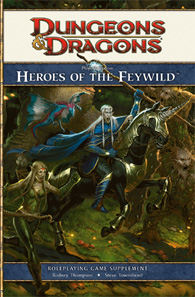Join the Heroes of the Feywild
 Player’s Option: Heroes of the Feywild (Amazon, B&N)
Player’s Option: Heroes of the Feywild (Amazon, B&N)
Dungeons & Dragons – Rodney Thompson, Claudio Pozas, Steve Townshend
Wizards of the Coast (160 pp, $29.95, Nov. 2011)
Fury of the Feywild Fortune Cards (Amazon)
Dungeons and Dragons
Wizards of the Coast ($3.99, Nov. 2011)
Reviewed by Andrew Zimmerman Jones
In roleplaying games, I’ve always been a fan of taking full advantage of each character’s unique traits. The statistics are a reflection of these unique traits, of course, but they aren’t the most important element. The differences between Dwarves and Elves goes far beyond just their Dexterity and Constitution bonuses, reflecting deep cultural differences that are far more interesting.
As such,I love supplements that help to differentiate even more between different types of characters. The Dungeons & Dragons Player’s Option book Heroes of the Feywild is superb at doing that for Feywild characters, providing both storytelling details about these engaging character types as well as new mechanics designed to support stories that feature the Feywild. If you want to enter into this world of raw magical power, this is definitely a must-have supplement.
To supplement the book, Wizards of the Coast also released an Fortune Cards expansion, Fury of the Feywild, which allows you to invoke feywild-linked events into your Dungeon & Dragons game in a more random fashion. You can download the rules for using Fortune Cards from Wizards directly.
In addition to ample setting and cultural information on the Feywild, including different suggestions on how to incorporate all of this into game sessions and campaigns, the mechanics stuff is useful as well. There are some new character theme options, epic destinies, feats, feywild gear, and magic items, such as Totems.
Three new Feywild races:
- Hamadryad
- Pixie
- Satyr
Four sets of class alternate features and subclasses, each with a related Paragon Path:
- Berserker (Barbarian subclass)
- Skald (Bard subclass)
- Protector (Druid subclass)
- Witch (Wizard subclass)
These are fairly self-explanatory, except perhaps for Skald, which represents a class of storyteller from societies that keep primarily oral histories. The emphasis of the Skald is as a historian more than a mere entertainer. This really appeals to me as someone who loves playing historian bard characters (though typically more in the “scholar” vein), so I’m definitely glad to have had the chance to add this book to my collection.
I will confess that I’ve never actually incorporated the Fortune Cards into my gaming experience, but I can definitely see them as a nice additional feature. These are fun little powers, events, and lucky breaks that can be invoked to mix things up, but don’t appear that they’d unbalance the game in any way. If you haven’t looked into them, they might be just the thing to add some spice and variety to your game sessions.
Disclaimer: A copy of the book and two booster packs of Fortune Cards were provided by the publisher at no charge for review purposes.
Andrew Zimmerman Jones is a writer of fiction and non-fiction. He has been a finalist in the Writers of the Future contest and received Honorable Mention in the 2011 Writer’s Digest Science Fiction/Fantasy Competition. In addition to being a contributing editor to Black Gate magazine, Andrew is the About.com Physics Guide and author of String Theory For Dummies. You can follow his exploits on Facebook, Twitter, and even Google+.